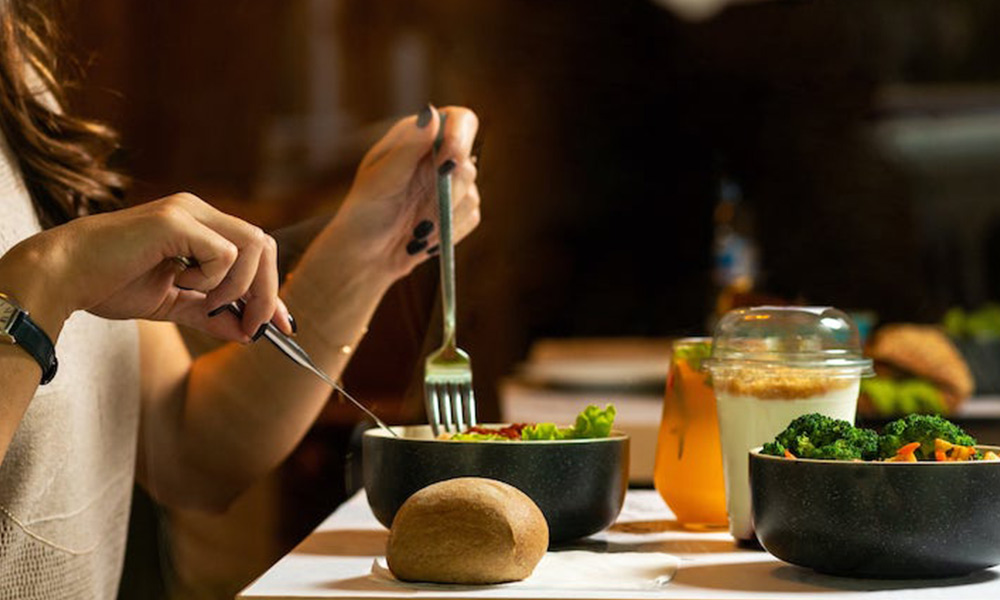For most of us, the busyness of life and daily responsibilities often make food preparation and mealtimes feel rushed. But being intentional about what we eat and how we eat is vital for staying healthy and maintaining wellness. This is where the concept of mindful eating comes in. In short, mindful eating is the opposite of unhealthy “mindless” eating. Instead, it’s about maintaining an awareness of the food you choose to eat. It can also extend to the process of buying, preparing, and serving food as well as consuming it. Embracing mindful eating can help you improve your diet, manage food cravings, and embrace a healthier lifestyle. Here are seven tips to start eating mindfully.
1. Honor Your Health with Gentle Nutrition Planning
Emerging evidence from MDAnderson shows that maintaining a healthy weight and lifestyle after a cancer diagnosis can reduce the risk of recurrence, as well as prevent other chronic diseases. The key here is to develop an approachable and sustainable nutrition plan. Rather than an aggressive weight loss plan, cancer survivors should honor their health by creating a plan that supports an overarching healthy lifestyle. This can be done through something as simple as choosing healthy snacks rather than foods with high saturated fat content.
2. Listen to What Your Body Needs
Do you ever find yourself mindlessly finishing your dinner or eating an unhealthy snack in the middle of the day, even when you’re not hungry? We all do. Mindful eating means listening to your body’s needs. It also means paying attention to your body’s hunger cues and understanding if you are still hungry or if you’re full.
3. Make Simple Switches to Improve Your Diet
Embracing a mindful eating approach doesn’t mean you have to completely give up the types of food and snacks you love. Instead, it’s an invitation to make simple switches to improve your diet and add a more wholesome nutritional approach to your eating habits.
4. Stick to Your Commitment by Stocking Your Kitchen with Nutritious Foods
Proper meal planning is key to mindful eating. It takes intentionality to ensure you’re purchasing and serving foods that can help you cultivate a healthy lifestyle. This means stocking your kitchen with nutritious foods. Planning your meal and snack options ahead of time is another way to eliminate some of the stress that often leads to choosing unhealthy or quick options.
5. Open Up Your Awareness
Taking time to enjoy your food and eat slowly often improves your digestion and gives you awareness of how you feel when you’re full. It can also be a meditative experience. Take time to notice the place settings, lighting conditions, and temperature. Do you notice steam rising up or water glistening on vegetables? As you begin eating, pay close attention to the smells, textures, and flavors you experience with each bite. Mindful eating can be a way of reclaiming eating and digestion after chemotherapy or radiation suppressed your appetite or dictated your food choices.
6. Limit Distractions While Eating
Focusing on what’s going on around you can distract you from the process of eating and take away from the mindfulness experience. If possible, try to limit distractions and avoid multitasking while eating. When you sit down to eat, become aware of those around you who are eating with you. In between bites, take the meal as an opportunity to check in with your loved ones. Be fully present as you ask and answer questions.
7. Notice When You’re Tempted to Eat, but Aren’t Hungry
One of the most common ways we mindlessly eat is when we go on autopilot with snacking and emotional eating. Rather than eating when our bodies are hungry, we eat to fill an emotional void. This makes sense because food is inherently nourishing and comforting! Being kind to ourselves and recognizing this pattern can help embrace mindful eating.
Mindful eating isn’t about being perfect, always eating the right things, or never allowing yourself to eat in a hurry again. Rather, it’s about committing to a lifestyle in which we’re more intentional about our eating habits. It’s about progress, not perfection. If you’re a cancer survivor looking for more nutritional guidance and support, Survivor Fitness is ready to connect you to the right nutritionist to help you embrace a healthier approach to your diet.


